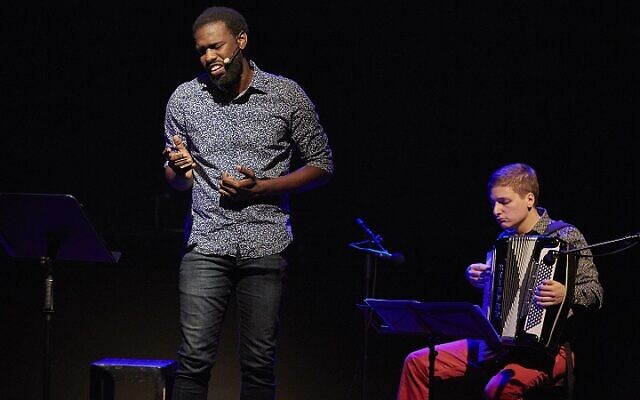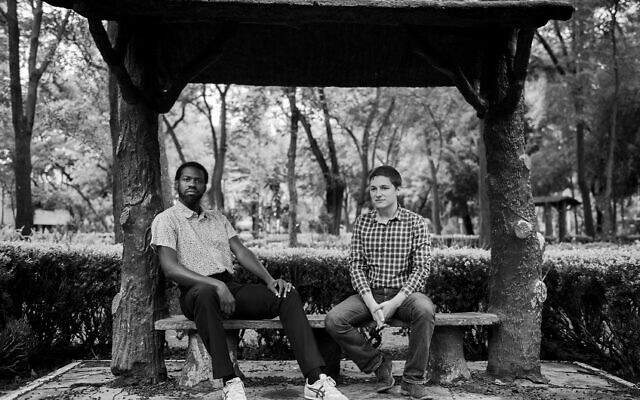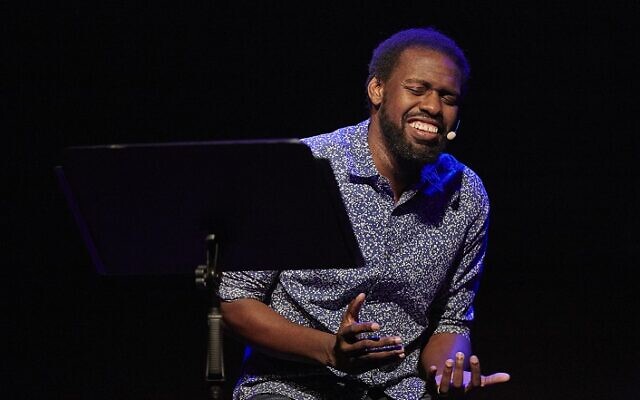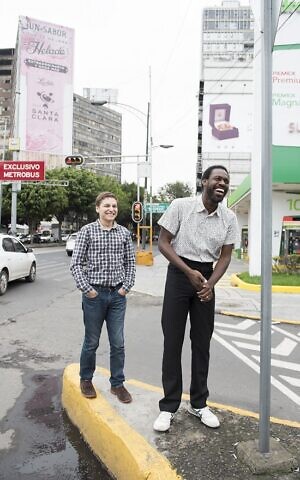Atlanta’s Yiddish Musical Gem
African American Anthony Russell, an accomplished Yiddish singer, has performed worldwide and now resides in Atlanta.
After 37 years with the Atlanta Journal-Constitution and now with the AJT, , Jaffe’s focus is lifestyle, art, dining, fashion, and community events with emphasis on Jewish movers and shakers.

Temple Beth Tikvah will host a concert featuring Anthony Russell and Dmitri Gaskin in a presentation of “Tsvey Brider” on Saturday evening, Dec. 10. Many components come into play as to why this will be a special event. Russell, a San Francisco native, is a formally trained lyric basso profundo, who just happens to be African American and married to Rabbi Mike Rothbaum.
Nancy Kassel, cantor of Beth Tikvah stated, “Russell performed in Atlanta once before, pre-pandemic, now that he lives here…he is considering this concert more of his Atlanta premiere. Younger generations may know short Yiddish expressions that have become part of a broad Jewish/non-Jewish lingo, but they rarely have exposure to the beauty and expressiveness of Yiddish song. The language and songs of Yiddish deserve to be kept alive and evolve into newer expression.”

Russell received his music degree from Holy Names University in Oakland, Calif. He and Mike moved to Atlanta from Massachusetts. He appeared in 2016 in a concert of European Jewish music at the Kennedy Center in Washington, D.C., performing also with Gaskin. Then, in the Radical Jewish Culture Festival in Berlin, Germany, in 2017, after which they toured Poland, and performed in Carnegie Hall’s Migrations Festival in New York City, and the Yiddish Summer Weimar Festival in Germany.
In terms of amazement by some of this particular talent based on Russell’s background, he said, “I was raised Christian, and it’s to that I attribute, in part, my initial cleaving to Torah and facility with Chumash. I am often asked what the reaction of my family was to my decision to become Jewish, the assumption being that it was negative or hostile. Had they witnessed my mother and grandmother, z”l, dancing with challahs at my wedding (a custom signifying wishes for abundance on the couple), I’m sure they would come to different conclusions.”

His two albums are: “Convergence,” with klezmer trio Veretski Pass, an exploration of 100 years of Ashkenazi and African American music. “Kosmopolitin” is a collection of original songs composed and arranged with Gaskin, set to modernist Yiddish poetry, for his Bay Area string ensemble, Baymele. Available on bandcamp.com.
Backing up to his marriage, after some initial internet correspondence, Russell met Rabbi Rothbaum in 2007 while visiting New York as a performer in a summer opera program. Their first date was a New York Mets game; the rest, “is history.”
He said, “I think we complement each other intellectually in many different ways: we’re both creatively inspired by Jewish text in ways that have led us to embody it in our own respective fashions—him from the pulpit and I from the concert stage.”
Tickets are $18 for nonmembers, free to Temple Beth Tikvah members. 9955 Coleman Road.

Russell, in conversation with the AJT, expresses his motivations:
AJT: How did you select your Hebrew name?
AR: Megilas Esther being one of my favorite stories as a child—it’s rather operatic—the choice of Mordechai was a given; Tzvi was an allusion to my favorite psukim Tehillim, 42:1. Little did I know at the time that Mordechai Tzvi was an old-fashioned combination, germane to my future as a Yiddish singer.
AJT: Do you get reactions like “YOU know Yiddish?”
AR: I do; I often reply in Yiddish, at which point, usually, the questioner admits to not knowing much of it themselves; perhaps this exchange will reevaluate assumptions as to who has access to the 1,000-year-old tongue of Ashkenazi Jewry…but one can never tell.
AJT: Your favorite Yiddish runes:
AR: “Kinder Yorn” is a classic that has long been in my repertoire. Who hasn’t looked back on one’s childhood with wistfulness? “Dos lid fun Bessarabia” is a great song of lyrical homesickness; “S’iz nishto keyn nekhtn” has the curious fate of being a rousing drinking song of Lubavitcher niggun origin.
AJT: What about Yiddish appeals to you?
AR: The history of Ashkenazi Jewry is in the Yiddish language, the geographic sprawl of its linguistic borrowings and tenses embraces almost every challenge the world has thrown up until today, shifting and changing to mold itself around the unfolding worlds of its speakers. What’s not to love?
AJT: Any Chanukah songs at the concert?
AR: I haven’t decided just yet, but…‘tis the season, eh?
- Professionals
- Arts and Culture
- Marcia Caller Jaffe
- temple beth tikvah
- Anthony Russell
- Dmitri Gaskin
- Tsvey Brider
- Rabbi Mike Rothbaum
- Nancy Kassel
- Yiddish
- Holy Names University
- Kennedy Center
- Radical Jewish Culture Festival
- Carnegie Hall
- Migrations Festival
- Yiddish Summer Weimar Festival
- Convergence
- klezmer trio Veretski Pass
- New York Mets
- Megilas Esther
- Mordechai Tzvi
- Kinder Yorn



comments